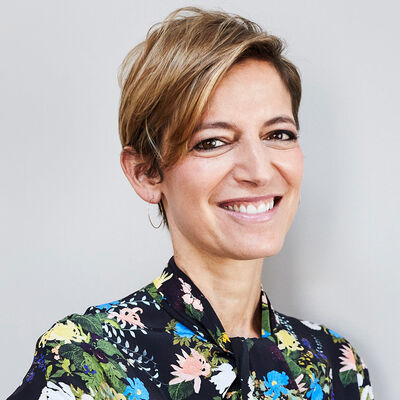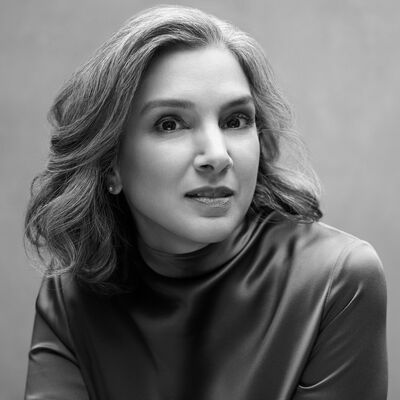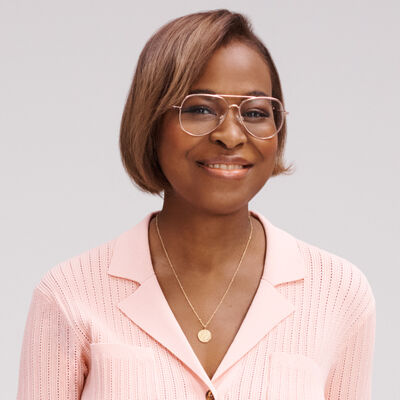Activist & CEO of The Meteor; Former Editor-in-Chief, Glamour

Cindi Leive: Biography at a Glance
- Former Editor-in-Chief of both Glamour and Self magazines, Cindi Leive is a journalist, media leader, and advocate for women’s rights.
- Leive is CEO of The Meteor, a feminist media company founded by a group of journalists, artists, filmmakers, and media leaders who believe in the power of stories to change culture—and the world.
- At Glamour, Leive grew the brand’s audience to a record 20 million across print and digital and built barrier-breaking initiatives like “Women of the Year,” the country’s preeminent event showcasing women.
- She is the co-author of numerous books, including the New York Times bestseller Together We Rise, about the making of the Women's March.
- As a journalist, Leive has interviewed Presidents Barack Obama and George W. Bush, First Ladies Michelle Obama, and Laura Bush, Secretary of State Hillary Clinton, Senator John McCain, Vice President Joe Biden, and personalities ranging from Jennifer Lawrence to Angelina Jolie.
- On stage, Leive tackles the most topical and difficult subjects of the day from women's rights to politics to media, and reflects on the seismic cultural shifts women are experiencing—and generating—now.
Videos
Biography
Former Editor-in-Chief of both Glamour and Self magazines, Cindi Leive is a journalist, media leader and advocate for women’s rights. Leive is CEO of The Meteor, a feminist media company founded by a group of journalists, artists, filmmakers, and media leaders who believe in the power of stories to change culture—and the world. A cultural critic and frequent TV contributor, Leive appears regularly on Good Morning America, Morning Joe, CBS This Morning, Today, CNN, and many other outlets and live events.
From career advice to the wage gap to women in Hollywood, Leive tackles the most topical and difficult subjects of the day. She speaks frequently on women’s rights, politics, the media, and reflects on the seismic cultural shifts women are experiencing—and generating—now.
During her 16 years at Glamour, Leive grew the brand’s audience to a record 20 million across print and digital and built barrier-breaking initiatives like “Women of the Year,” the country’s preeminent event showcasing women, and #PoweredbyWomen, which promoted female creative talent. She is also the founder of The Girl Project, which supports girls’ education and made Glamour the first media brand with a nonprofit initiative.
As a journalist, Leive has interviewed Presidents Barack Obama and George W. Bush, First Ladies Michelle Obama, and Laura Bush, Secretary of State Hillary Clinton, Senator John McCain, Vice President Joe Biden, and personalities ranging from Jennifer Lawrence to Angelina Jolie.
She is the co-author of numerous books, including the 2018 New York Times bestseller Together We Rise, about the making of the Women's March. Her powerful and widely read op-ed for the New York Times, “Let’s Talk About My Abortion (and Yours),”gives a new look at the ongoing debate, and created a viral discussion of the secrets women keep.
Leive has won many media awards, including five National Magazine Awards and an Emmy for Glamour. She has also received numerous honors for her work on behalf of women, including the Nat King Cole Award from the Entertainment Industry Foundation, the Matrix Award, the White House Project Award, and the Media Partner Award from the U.N. Fund to End Violence Against Women.
A senior fellow at the University of Southern California’s Annenberg Center, Leive serves on the boards of Time’s Up, Swarthmore College (her alma mater), and the International Women’s Media Foundation.
Topics
For years, employers have loved to characterize their younger staffers as “entitled”—and wrung their hands about why “no one wants to work anymore.” But the willingness to ask for what you want, especially if you’re a member of a historically marginalized group, isn’t entitlement at all, and it’s exactly what you need to do in order to change your own career and the world around you. This talk is required listening both for women charting their own careers, and any manager looking to build a team in the post-Great-Resignation landscape.
We are living through an unprecedented moment of activism in the US. One in five American women has taken part in a protest over the last three years—for political change, for racial justice, and, since the overturning of Roe v. Wade, for bodily autonomy. Women and nonbinary people of all ages are rethinking everything from our workplaces to how we raise our children. But how do we make SUSTAINED change and true equality for all women happen? With insights from her decades of connecting with young women, Cindi Leive delivers a manifesto about what’s working, what isn’t, and what each of us can do. This speech is essential listening for the women, men, institutions, and companies that are dedicated to building a fairer future.
After nearly every speech, Cindi Leive is invariably approached by young women with the same question: “Can I ask you about your career?” With her tenure as Editor-in-Chief of Self magazine and Glamour, one of the most widely-read and influential women’s magazines, Leive’s road was filled with unconventional decisions and steady determination. In this speech, Leive distills the path she took and shares strategies for a post-Lean in world.
From presenting ideas and negotiating salary to dealing with bias and discrimination on the job, Leive highlights the shifting playing field, the strategic language to use, and the resilience necessary to get ahead. In an era when women understand their value and are more motivated than ever to advance their careers, Leive is encouraging women to take the reins and establish their worth across industries.
When we say “the media,” we all know what’s implied: an elusive organization that makes decisions about what gets printed, aired, or run, and how we should feel about it. But in this era of misinformation and fake news, we now demand more from the media. We expect the media to represent us, to listen to us, and to create material that is neither biased or condescending.
During her time at Glamour, Cindi Leive witnessed a massive disruption in the media business, particularly in how women’s interest magazines became feminist platforms in a way that seemed unlikely—even a decade ago. Despite Glamour’s own history of feminism and activism, Leive played an instrumental role in reshaping the magazine’s brand to promote body positivity as well as powerful women in politics and culture.
In this speech, Leive discusses the increasingly important role of journalism, especially as digital dominates print, and media outlets are increasingly shifting their focus from entertainment to politics and current events. Leive outlines what these shifts mean for the future of media, our culture, and our politics.
Sometimes the outside world sees “fashion” as shallow or tyrannical. Yet some of the most creative, collaborative, and innovative work being done is in the world of fashion. In this speech, Cindi Leive leverages her 16 years at Glamour and as a top commentator on fashion and style to illustrate how fashion is much more than beauty and aesthetics, but a synthesis of culture, art, and social change.
FAQs
Contact CAA Speakers at (424) 288-2898 or speakers@caa.com to book Cindi Leive to speak at corporate or private events, keynote speeches, speaking engagements, workshops, fireside chats, motivational speaking, or virtual appearances.
Quick booking process- Email CAA Speakers with event details
- Get availability confirmation within 24 hours
- Review speaking fee and contract terms
- Sign agreement and finalize logistics
As one of the most influential talent agencies in the world, CAA handles all speaking engagements from contract to event day coordination.
CAA Speakers is the preferred booking agency to contact for Cindi Leive’s speaking engagements. Contact speakers@caa.com for all Cindi Leive in-person appearances and keynote speaking requests.
Contact Cindi Leive's agent- Email: speakers@caa.com
- Website: caa.com/caaspeakers
- Response: Within 24 hours
CAA Speakers can check Cindi Leive's speaking calendar with direct access to availability and official pricing. While many websites may list Cindi Leive, CAA Speakers is the direct source for authentic information about availability and pricing.
Cindi Leive's speaking fee varies by event type, location, and requirements. As a top keynote speaker, Cindi Leive's fee reflects their expertise and market demand.
Speaking fee factors:- Event type and audience size
- Travel distance and logistics
- Presentation length and customization
- Virtual vs. in-person delivery
Additional costs: Travel, accommodation, A/V requirements, and optional meet-and-greets.
Contact CAA Speakers at speakers@caa.com for Cindi Leive's current speaking fee and detailed cost breakdown.
The cost to book Cindi Leive as keynote speaker includes their speaking fee plus travel and logistics expenses.
Total booking cost includes:- Cindi Leive's keynote speaking fee
- Travel and accommodation
- Technical requirements and A/V setup
- Optional add-ons like book signing and meet & greets
- Virtual presentations
- Local/regional events
- Off-peak booking periods
- Flexible event dates
Email speakers@caa.com for Cindi Leive's exact booking cost and customized pricing proposal.
Contact CAA Speakers at speakers@caa.com for all Cindi Leive speaking engagements.
Official contact for Cindi Leive bookings:- Email: speakers@caa.com
- Website: https://www.caa.com/caaspeakers/cindi-leive
- Response time: 24 hours
Include your event date, location, audience size, and budget when contacting CAA about booking Cindi Leive.
Yes, Cindi Leive speaks at virtual events with professional-grade equipment and interactive presentation style.
Cindi Leive's virtual event options:- Live virtual keynotes with Q&A
- Interactive workshops and breakouts
- Hybrid events (in-person + virtual)
- Pre-recorded presentations
Virtual events offer global reach, flexible scheduling, and reduced travel costs while maintaining Cindi Leive's engaging presentation quality.
Contact CAA Speakers for Cindi Leive's virtual event availability and technical specifications.
Book Cindi Leive for corporate conferences, industry events, private functions, and virtual presentations. Cindi Leive customizes content for any audience size or event type.
Event types:- Corporate meetings and conferences
- Industry summits and trade shows
- Private executive retreats
- Educational institution events
- Virtual and hybrid conferences
Cindi Leive engages audiences from private executive meetings to large conferences with thousands of attendees.
Contact CAA Speakers to discuss how Cindi Leive can customize their presentation for your specific event.
Check Cindi Leive's speaking availability through CAA Speakers at speakers@caa.com. Book 3-6 months in advance for best date selection during peak seasons (September-November, March-May).
Availability factors:- Event date and location
- Speaking fee and budget
- Lead time for booking
- Peak conference seasons
- 3-6 months: Best availability
- 3-6 months: Best availability
- 2-3 months: Good availability
- 1-2 months: Select availability
- Under 30 days: Limited availability
Contact CAA early in your planning process to secure Cindi Leive for your preferred event date.
Book Cindi Leive through CAA Speakers for guaranteed authentic representation and professional event coordination. CAA is the preferred booking agent for Cindi Leive, with direct access to their speaking availability and decades of experience representing the world’s top keynote speakers.
CAA booking advantages:- Direct access to Cindi Leive's calendar
- 24-hour availability confirmations
- Professional contract negotiation
- Full logistics coordination
- Industry-leading client service
Trusted by Fortune 500 companies for their most important speaking engagements. Contact speakers@caa.com to book Cindi Leive for your next event.
Yes, Cindi Leive speaks at private corporate events, executive retreats, board meetings, and exclusive functions.
Private event types:- Executive retreats and board presentations
- Client entertainment and VIP gatherings
- Corporate celebrations and award ceremonies
- Private dinners and exclusive functions
Private event benefits: Customized content, enhanced interaction, complete confidentiality, and flexible scheduling.
Contact CAA Speakers for Cindi Leive's private event availability and confidential pricing proposals.
CAA Speakers responds to Cindi Leive booking inquiries within 24 hours during business days. Complex requests or international events may take up to 48 hours for detailed proposals.
Response timeline:- Initial acknowledgment: Within 24 hours
- Availability confirmation: 24-48 hours
- Detailed pricing proposal: 48-72 hours
- Urgent requests: Same-day priority response
Include complete event details (date, location, audience size, budget) for fastest response times.
Book Cindi Leive 3-6 months in advance for best availability, especially during peak speaking seasons. Early booking ensures better date selection and rate negotiations.
Recommended booking timeline:- 3-6 months: Optimal availability and pricing
- 2-3 months: Good availability
- 1-2 months: Select availability
- Under 30 days: Limited availability
Peak seasons: September-November and March-May book fastest. Contact CAA Speakers early for priority consideration.
Get Cindi Leive pricing information by contacting CAA Speakers at speakers@caa.com with your event details. Receive detailed cost breakdown within 24-48 hours with no obligation to book.
For accurate pricing, include:- Event date and location
- Audience size and type
- Event format and duration
- Budget parameters
CAA provides transparent pricing with all costs included - speaking fee, travel, accommodation, and technical requirements.




